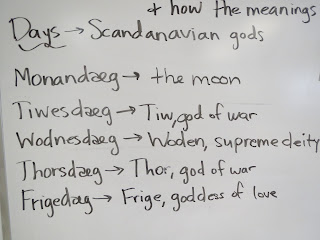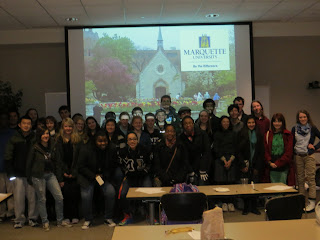http://www.huffingtonpost.com/2013/09/28/proto-indo-european-language-ancestors_n_4005545.html
Saturday, September 28, 2013
Tuesday, September 24, 2013
Thursday, September 5, 2013
Sunday, July 28, 2013
"20 awesomely untranslatable words from around the world"
Enjoy these 20 words!
http://matadornetwork.com/abroad/20-awesomely-untranslatable-words-from-around-the-world/1/
Please don't "tingo" from me.
http://matadornetwork.com/abroad/20-awesomely-untranslatable-words-from-around-the-world/1/
Please don't "tingo" from me.
| http://termcoord.files.wordpress.com/2013/01/lexical-gaps1.jpg |
Monday, July 1, 2013
Sunday, June 30, 2013
Final Exam Essay Example
Thank you to Marina for allowing me to share her final exam essay on this blog. The final exam essay prompt in Linguistics is very open-ended, essentially what have you learned in this class. The first time I assigned such a broad question I was nervous about what kind of response I would get, but students have impressed me with their insights.
Marina J.
Linguistics
Ms. Loosen
1 June 2013
In
Linguistics
It is rare in high school walk away from a class knowing
what you have learned will stick with you and be applicable in the real world. The knowledge I gained in linguistics
extended beyond the classroom. With the
school year drawing to a close, I plan to seek other means of studying parts of
linguistics, but just in this year I learned about the history of the English
language, the acquisition of language, how body language is used, and sociolinguistics. I also learned that I'm a bit of a
descriptivist. This class is proof that
students can learn a lot from stepping back and analyzing what makes someone
alive; their ability to understand and use language.
In the average English class, a student does not find the
history of the language. Linguists map
out English as a branch of the Germanic language. Developed in Britain, Germanic tribes brought
with them what is now considered to be Old English. Circa the 13th century, Britain was conquered
by the Normans who spoke a sort of French.
This added many French words into the English language, such as bouquet
and clique. Then, circa the 15th-16th century, began what is known as the
Great Vowel Shift. We saw that the long
vowels shifted upwards. Listening
around, we know that language does not change much overnight but the English
language is expanding and evolving constantly.
Here we are with what is called Late Modern English. As young, creative thinkers, we were excited
to learn, or more so, realize, that we have all the power to change the
language we speak. Seeing slang,
throughout history, transitioning into common language was interesting because
students are so often told that their language is "wrong". I have learned that kids these days are not
destroying the language. It is simply
evolving. Linguistics taught me to
appreciate English in its complexity and insanity.
This year I was fascinated by how a person acquires
language. A child listening to and
learning language while still in the womb is almost frightening but it is truly
amazing how children pick up on grammar and universal grammar. A person's knowledge of language grows as
fast as they do. I could see this with
Ben. The first time in class, he spoke
in broken sentences and mixed up letters.
Then in his second visit, I could hear him speaking with more confidence
and responding in comprehensible sentences.
I learned and have seen outside of the class that young kids do either,
over apply grammar rules, or don't use them at all. The Wug test showed this. I will likely never forget what a Wug looks
like. I now know the basics of language
that maybe teachers should have been teaching to elementary school
student. Knowing a morpheme is a
meaningful unit of a word that cannot be further divided, may have helped me on
spelling tests. Knowing that a phoneme
is a distinct unit of sound may have helped as well. Linguistics has made me wish I was bilingual,
in the native-speaker sense but MSL has been a wonderful environment for
building the bridges of language. At
this age, my classmates and I have little time to waste if we really wish to
fully understand the mental structure of our foreign languages.
Sociolinguistics was my favorite part of the year because
the material was easiest to observe outside of the class. I had realized it before, that I code-switch
but I had not known before what it was called.
I have begun paying more attention to my dialect shifts. However, I do not agree with what we learned
on genderlects. In my own environment,
women and men speak far too familiar for them to claim different dialects. Each person, rather, has their own way of
communicating with their own dialect. Learning
to recognize the differences in the body language of men vs. women, was
interesting though. I agree, women are
more personal in a conversation and men pose to face the room. Walking with power makes a person appear to
have authority and speaking sharply and confidently gives a person power as
well. I may take a class in college that
further explores body language or sociolinguistics as a broader subject. I have taken the time to read articles by
Noam Chomsky and I wish I had more time in the day to study what he proposes.
A great class offers students more than lists of facts, notes, and names. Linguistics offers new perspectives on the way
people work together in a society and gives a person an understanding of how
and why people think differently from one another. One of my favorite new words that I can
remember off the top of my head is "aware". In Japanese, "aware" is the word
used for the bittersweet decline of something beautiful experienced in a brief
moment. I experienced a moment to use "aware"
this week when I picked the last branch of lilacs from my yard and watched them
wilt on my nightstand. I am driven to
learn new words and ways to express thoughts and feelings. I have learned to appreciate all languages
and recognize that no language is, or ever was, primitive. I am increasingly aware of my language in all
of its forms and the languages used around me by classmates compared to friends
compared to people in other communities.
Linguistics opened up a new kind of learning, one which takes place in
everyday life. I have learned to love a
high school class.
Wednesday, May 22, 2013
Our Youngest Guest Speaker Returns!
My son came in five months after his first appearance in Linguistics class so that we could discuss his growth during his "language explosion" period. Ben was told that he would be coming in to teach the students about baseball.
Sunday, May 12, 2013
Our Linguistics class was in the newspaper!
"MPS teacher's linguistics class an example of valuable, enterprising course" by Alan J. Borsuk
http://www.jsonline.com/news/education/mps-teachers-linguistics-class-an-example-of-valuable-enterprising-course-nc9qlkg-206114351.html
Friday, May 10, 2013
Research Project Presentation Rubric
Linguistics
Research Presentation Rubric
(5 minute presentation, 25 points)
5 pts. for Delivery (eye contact, organization, professional appearance, support for partner)
15 pts. for Content (background info, hypothesis, experiment, results, analysis)
5 pts. for Visual (hand-out, poster, powerpoint/prezi, graph, chart)
Friday, May 3, 2013
Research Project Requirements
Linguistics Research Project
Spring 2013
- You may work with one partner.
- Remember that linguists are scientists. You will use the scientific method for
your project.
The
steps of the scientific method are to:
1. Ask a Question
2. Do Background Research
3. Construct a Hypothesis
4. Test Your Hypothesis by Doing an
Experiment
5. Analyze Your Data and Draw a
Conclusion
6. Communicate Your Results
Here’s
how we’ll do that:
1. Ask a Question Picking your topic is a very
important part of the process. Start by
asking a question that you have related to language. Think about what you’ve written about in your
Daily Language Observations as a starting point. Select a question/ topic that is narrow
enough so that you can say something significant about what you learn. For example, “Sociolinguistics” is not an
appropriate topic; it is a vast field about which hundreds of books have been
written. “How Often Spontaneous
Conversations Happen in Elevators at West Allis Memorial Hospital on May 8, 2013”
is a more manageable topic.
2.
Do Background Research Look
up your topic online and in books. Have
other linguists written about your topic?
Take notes on what you find, keeping careful track of your sources.
3.
Construct
a Hypothesis What
do YOU expect to find as the answer to your initial question?
4.
Test Your Hypothesis by Doing an
Experiment How will you
test your hypothesis? Through
observation? Through a survey? By eliciting data similar to how William
Labov did as he studied the relationship between social class and r-lessness in
the three stores in New York City
5.
Analyze Your Data and Draw a
Conclusion What have you learned? What does your data show?
6.
Communicate Your Results
What does your study teach us as linguists and as
people? What are the more far-reaching
implications of your study?
How
to Present Your Research:
·
Write a 4-6 page
essay in MLA format with in-text citations and a Works Cited page. It would be appropriate to use headings to
break up your essay to show the different parts of your study.
·
Plan a five
minute presentation to the class with the assistance of a visual aide (ex: poster, graph, hand-out, Power Point, Prezi).
Sunday, April 28, 2013
Thursday, April 25, 2013
Etymology Assignment
Every word has a history. Etymology is the study of the origin of words and how the means of words have changed over time.
2. Tundra
3. Bog
4. Canyon
5. Villain
6. Sauna
7. Buffalo
8. Worm
9. Sinister
10. Yacht
Next research the etymology of five words you enjoy and are curious to learn more about.

Using a
dictionary and the internet, research the ETYMOLOGY of the following words:
1. Banana2. Tundra
3. Bog
4. Canyon
5. Villain
6. Sauna
7. Buffalo
8. Worm
9. Sinister
10. Yacht
Next research the etymology of five words you enjoy and are curious to learn more about.

Sunday, April 21, 2013
TED-Ed
I went to a conference on creativity and technology at the Milwaukee Art Museum yesterday where Logan Smalley, the director of TED-Ed, spoke. TED-Ed provides hundreds of lessons created by teachers, animated by professionals. Several great lessons related to Linguistics are available on the site. My students are currently studying the History of English in our Linguistics class so below you will find some links to great videos relating to the history of English and word etymology. Teachers have the ability to "flip" a lesson, which means to tailor the lesson for their own students.
"How did English evolve?"
http://ed.ted.com/lessons/how-did-english-evolve-kate-gardoqui
"Why is there a 'b' in 'doubt'?"
http://ed.ted.com/lessons/beyond-the-shadow-of-a-doubt-gina-cooke
"Making sense of spelling?"
http://ed.ted.com/lessons/making-sense-of-spelling-gina-cooke

"How did English evolve?"
http://ed.ted.com/lessons/how-did-english-evolve-kate-gardoqui
"Why is there a 'b' in 'doubt'?"
http://ed.ted.com/lessons/beyond-the-shadow-of-a-doubt-gina-cooke
"Making sense of spelling?"
http://ed.ted.com/lessons/making-sense-of-spelling-gina-cooke
Saturday, April 6, 2013
Language Magazine Online
http://languagemagazine.com/online/
I just found this great magazine; their content is free on their website--tons of accessible articles for high school students!
Saturday, March 9, 2013
Monday, February 25, 2013
Scones in Wisconsin: British English vs. American English
As an Anglophile and a teacher of Linguistics, I had to spend talking with my students about the differences between American and British English. The Project Britain website provides wonderful resources on lexical differences between British and American language and culture. I used their fill-in-the-blanks worksheet as a small group activity while we all enjoyed some tea and biscuits. Then each group got a hand-out related to either food, people, places, clothing, or school and hand to come up with a sentence using as many British English words as possible.
An example sentence students wrote and then "translated" for us is: "My mate met a lollypop man and the lad turned out to be a nutter and wouldn't let my chum cross the lane even after a bobby came by."
http://www.projectbritain.com/activities.html
Saturday, February 16, 2013
Pidgin Dinner 2013
It's a funny thing to walk into an English classroom where English is not allowed, but that's what my students did yesterday. MSL Linguistics students shared a feast seated next to fellow classmates who speak different native or second languages than they do. Students spoke Spanish, French, German, Mandarin, Wolof, Hmong, and Serbian and managed to be able to get the chicken, egg rolls, tacos, noodles and desserts passed around the room. We all recognized the importance of facial expressions and gestures in our communication.
Enjoy some photos from the event!
Enjoy some photos from the event!
Sunday, February 3, 2013
TED Talk on Language Acquisition
This TED talk is a great 10 minutes spent learning about language acquisition. It's very accessible for high school students:
http://www.ted.com/talks/patricia_kuhl_the_linguistic_genius_of_babies.html
Saturday, February 2, 2013
NACLO 1/31/13
We participated in NACLO this year at Marquette University. Thanks so much to organizational mastermind Dr. Joyce Tang Boyland whose efforts led to the Marquette/UWM sites having more students participating in NACLO than anywhere else in North America!
We also enjoyed meeting up with MSL (and Linguistics class) alumni and current Marquette freshmen Kylie Dolphin and Daniel Bernard.
In the afternoon, we had a chance to visit the Raynor Library to see their collection of J.R.R. Tolkien's manuscripts, including his original drafts of The Hobbit.
We also enjoyed meeting up with MSL (and Linguistics class) alumni and current Marquette freshmen Kylie Dolphin and Daniel Bernard.
In the afternoon, we had a chance to visit the Raynor Library to see their collection of J.R.R. Tolkien's manuscripts, including his original drafts of The Hobbit.
Subscribe to:
Posts (Atom)
































